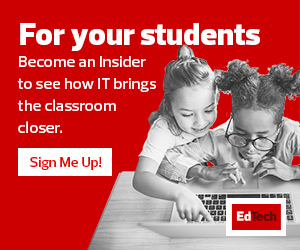Librarians Embrace the Role of Information Professional
In many districts, books aren’t the only resource that librarians have had to juggle. Because their job is to connect people with information, many have also taken on enhanced responsibilities regarding digital resources and technical support.
One Texas librarian who participated in the SLJ survey told the journal that her district’s library staff are now “almost exclusively tech support for parents and students having connectivity and/or device issues.”
To meet the need for digital guidance, many librarians have been compiling online resources for students, parents and educators.
DISCOVER: 5 tips for finding the best PD platform for your district’s teachers.
Sarah Mowery, who worked for 16 years as a librarian and technology coach in elementary and middle schools, took action as soon as she learned her school wouldn’t reopen following an extended spring break in March 2020. As a professional instructional specialist with INFOhio — an educational resource and support provider that bills itself as “Ohio’s PreK–12 digital library” — Mowery began focusing on access to resources, collaboration and technology support in addition to finding ways to provide books.
Writing on the organization’s website, Mowery describes how she built a virtual library document bursting with digital resources that were easily and remotely accessible. She also shared tools such as Common Sense Education’s Digital Tools for School Libraries and Media Centers. Following Mowery’s lead, librarians can share and create their own virtual libraries of resources based on their district’s needs.
In addition to disseminating digital resources, librarians can also make themselves available to classes and families who may need additional support. Library staff can also hold daily office hours and work with teachers to provide the information that students need for projects, reports and other remote lessons.
LEARN MORE: The evolving role of IT in remote education.
Libraries Can Adapt to a Future of Hybrid Learning
As schools shift from remote learning to hybrid instruction, librarians face new unknowns. A survey from the American Association of School Librarians found that 17 percent of district libraries plan to fully resume operations over the course of 2021.
As students gradually return to campus, librarians are trying to incorporate best practices for sanitizing physical libraries while maintaining the integrity of the materials within. In the Future Ready Librarians Facebook group, for instance, one member solved the problem of fogger disinfectants damaging books by hanging inexpensive plastic shower curtains in front of the shelves.
In a hybrid learning environment, school library staff will likely continue their role as pillars of information support. Technology will continue to be a major asset in classrooms, and librarians are laying the groundwork to help communities access the resources they need.
MORE ON EDTECH: What Role Hybrid Learning Will Play in the Future of K–12 Education.











